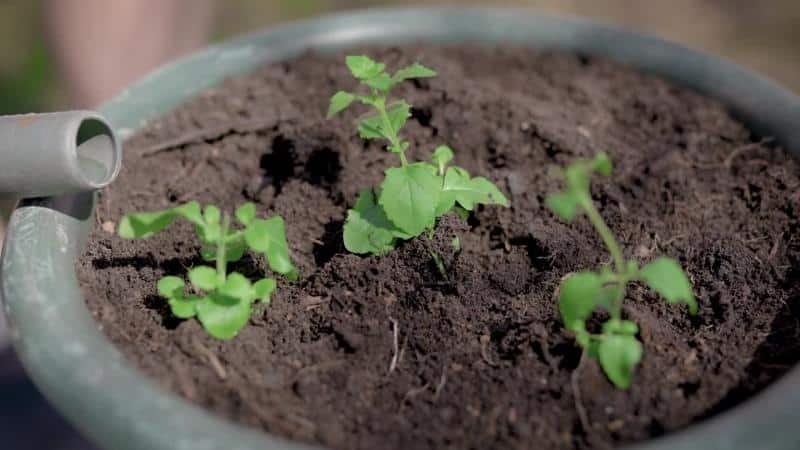The Tulsi plant, also known as Holy Basil, is a sacred herb in Hinduism and is revered for its medicinal properties. It is widely cultivated for its religious significance and its many potential health benefits.
Read More:
Tulsi, scientifically known as Ocimum tenuiflorum, is an aromatic plant native to India and traditionally used in Ayurvedic medicine. Revered in Hindu culture as the embodiment of the goddess Tulsi, this sacred herb holds significant religious and spiritual value. Beyond its religious connotations, Tulsi is highly regarded for its potential health benefits.

The leaves of the Tulsi plant contain essential oils, phytochemicals, and antioxidants that have been studied for their anti-inflammatory, antimicrobial, and adaptogenic properties. These properties make it a popular ingredient in Ayurvedic remedies, teas, and essential oils. With its long history of traditional use and emerging scientific research, the Tulsi plant continues to captivate the attention of both faithful and health-conscious individuals worldwide.
What Is Tulsi?
Tulsi, also known as Holy Basil, is a sacred plant in Hinduism. It is revered for its medicinal properties and is used in traditional Ayurvedic remedies for various ailments. With its distinctive aroma and flavor, Tulsi is not only a spiritual symbol but also a prized herb in natural medicine.
Tulsi, also known as Holy Basil, is a sacred plant in Hindu culture and has a long history of importance in Ayurvedic medicine. Let’s delve into the world of Tulsi and explore its origin, cultural significance, as well as its botanical features and types.
Origin And Cultural Significance
- Origin:
- Tulsi is native to the Indian subcontinent and is believed to have originated in the tropical regions of Southeast Asia.
- It has been cultivated for over 3,000 years and is deeply intertwined with the culture and religious practices of India.
- Cultural Significance:
- In Hindu mythology, Tulsi is considered the incarnation of the goddess Lakshmi and is revered as a symbol of purity and divine protection.
- It is believed that Tulsi brings good luck and prosperity to the household and is often planted near the entrance of homes.
- Tulsi is an integral part of religious rituals, ceremonies, and festivals, being offered to deities and used in prayer beads.
- It is also used in traditional Ayurvedic medicine for its numerous health benefits, including boosting the immune system, relieving stress, and promoting overall well-being..

Botanical Features And Types Of Tulsi
- Botanical Features:
- Tulsi is an aromatic perennial plant with a strong, pleasant fragrance. It belongs to the Lamiaceae family and is scientifically known as Ocimum tenuiflorum.
- It typically grows up to 1-2 feet in height and has small, elliptical-shaped leaves with serrated edges.
- The flowers of Tulsi are often purplish or white, arranged in compact clusters, and bloom during the warm months.
- It is a hardy plant that thrives in warm climates and requires well-drained soil and ample sunlight to flourish.
- Types of Tulsi:
- There are several types of Tulsi with distinct characteristics and properties:
- Krishna Tulsi: Known for its dark purple or almost black leaves, Krishna Tulsi is highly valued for its medicinal properties and is often used in Ayurvedic preparations.
- Rama Tulsi: Rama Tulsi has green leaves and is considered the most common type. It is widely used in herbal teas and as a culinary herb.
- Vana Tulsi: Vana Tulsi, also known as wild Tulsi, has light green leaves and a stronger aroma. It is often used for its medicinal benefits and is considered a sacred herb in Hindu rituals.
Tulsi holds immense significance in Hindu culture, where it is revered for its spiritual, cultural, and medicinal virtues. Its rich historical background, botanical features, and various types make Tulsi a remarkable and revered plant that continues to captivate people worldwide.
Ancient Ayurvedic Uses
The Tulsi plant, an ancient Ayurvedic herb, has been used for centuries for its medicinal properties. It is believed to boost immunity, relieve respiratory ailments, and promote overall well-being. Its versatile uses make it an essential part of traditional Ayurvedic treatments.
The Tulsi plant, also known as holy basil, has been cherished for centuries for its various medicinal properties. Its use in ancient Ayurvedic practices has made it an integral part of traditional Indian medicine. Let’s explore the historical significance of the Tulsi plant and its numerous applications in Ayurveda.

Traditional Medicinal Practices:
- Supports respiratory health: Tulsi leaves have been used to alleviate symptoms of respiratory illnesses like coughs, colds, and bronchitis. The plant’s expectorant properties help in clearing phlegm and promoting better breathing.
- Boosts immunity: Tulsi is renowned for its immunomodulatory properties. It strengthens the immune system, making the body more resistant to infections and diseases.
- Relieves stress and anxiety: The adaptogenic properties of Tulsi help the body cope with stress and anxiety. Regular consumption of Tulsi tea or extracts can promote relaxation and mental well-being.
- Improves digestion: Tulsi leaves stimulate the digestive system, aiding in better absorption of nutrients and relieving digestive issues like gas, bloating, and indigestion.
Historical Significance In Indian Medicine:
- Centuries-old usage: The Tulsi plant holds immense significance in Ayurveda, an ancient Indian system of medicine. Its mention can be traced back to ancient scriptures like the Charaka Samhita and Sushruta Samhita, where it is celebrated for its medicinal properties.
- Sacredness in Indian culture: In Indian households, the Tulsi plant is often considered sacred and is worshipped for its spiritual and medicinal value. It is believed to purify the environment, ward off negative energies, and promote overall well-being.
- Treatment for various ailments: In Ayurvedic medicine, Tulsi is prescribed for a wide range of conditions, including fever, respiratory disorders, skin diseases, arthritis, diabetes, and digestive ailments. It is used in different forms, including dried leaves, powders, extracts, and decoctions.
- Antibacterial and antiviral properties: Tulsi possesses antibacterial, antiviral, and antifungal properties, making it effective in combating infections caused by microbes. Ayurvedic practitioners have utilized Tulsi to treat various microbial infections throughout history.
The Tulsi plant’s rich history and its extensive usage in Ayurveda testify to its incredible medicinal value. From supporting respiratory health and boosting immunity to relieving stress and improving digestion, Tulsi continues to be an integral part of traditional Indian medicine.
Incorporating Tulsi into our daily lives can harness its numerous benefits and contribute to our overall well-being. So why not embrace the wisdom of ancient Ayurveda and embrace the power of the Tulsi plant today?
Health Benefits
Tulsi, also known as the Holy Basil plant, offers numerous health benefits. It helps boost immunity, reduces stress, promotes digestion, and has antioxidant properties. Additionally, it can relieve respiratory issues like cough and cold.
One of nature’s gifts to humanity, the Tulsi plant, also known as Holy Basil, is revered for its numerous health benefits. From boosting the immune system to relieving stress and anxiety, this powerful herb has been used for centuries in traditional medicine.

In this blog post, we will explore some of the compelling reasons why you should consider incorporating Tulsi into your daily routine.
Boosting The Immune System:
- Tulsi is known for its immunomodulatory properties, meaning it helps to strengthen the immune system to fight off infections and diseases.
- This herb is rich in antioxidants and essential nutrients, which play a vital role in supporting overall immune health.
- Regular consumption of Tulsi can help improve your body’s defense mechanism and reduce the frequency of illnesses.
Relieving Stress And Anxiety:
- Tulsi is widely acclaimed for its adaptogenic properties, which help the body adapt to stress and promote a sense of calm and relaxation.
- Drinking Tulsi tea or including Tulsi leaves in your diet can have a calming effect on your mind, reducing anxiety and promoting mental well-being.
- Research suggests that Tulsi has anti-depressant and anti-anxiety effects, making it a natural remedy for those experiencing stress-related symptoms.
Regulating Blood Sugar Levels:
- Tulsi has been used in Ayurvedic medicine as a natural way to regulate blood sugar levels.
- The compounds found in Tulsi leaves help in the metabolism of carbohydrates and fats, ensuring that the glucose in your bloodstream is utilized effectively.
- Incorporating Tulsi into your diet can be beneficial for people with diabetes or those at risk of developing the condition.
Improving Respiratory Health:
- Tulsi is highly regarded for its expectorant and bronchodilator properties, making it effective in relieving respiratory issues.
- Regular consumption of Tulsi tea or Tulsi-infused decoctions can help alleviate symptoms of cough, cold, bronchitis, and asthma.
- The antimicrobial and anti-inflammatory properties of Tulsi leaves promote healthy lungs and respiratory function.
Incorporating Tulsi into your daily routine can be a game-changer for your overall health and well-being. Whether you choose to consume it as a tea, add it to your dishes, or take it in supplement form, the health benefits of Tulsi are worth exploring.
Embrace the power of this sacred herb and unlock its remarkable potential.

Ideal Growing Conditions
Tulsi plants thrive in warm and tropical climates, preferring temperatures between 70-90 degrees Fahrenheit. They require abundant sunlight, well-drained soil, and regular watering to ensure optimal growth.
Tulsi plant, also known as holy basil, is a popular herb in Ayurvedic medicine and is highly valued for its medicinal properties. If you’re interested in growing your own tulsi plant, it’s important to understand the ideal growing conditions for this herb.
In this section, we’ll discuss the climate and temperature requirements as well as soil preparation and fertilization tips to help you successfully cultivate a thriving tulsi plant.
Climate And Temperature Requirements
Tulsi plants thrive in warm and tropical climates, making them ideal for regions with a temperate climate. Here are some key points to keep in mind regarding the climate and temperature needs of the tulsi plant:
- Tulsi plants prefer temperatures between 65°F to 90°F (18°C to 32°C).
- They require at least six hours of direct sunlight each day for optimal growth.
- These plants are sensitive to frost, so it’s important to protect them during chilly nights by covering them with a cloth or bringing them indoors.
- Tulsi plants can withstand high humidity levels, which makes them suitable for areas with tropical climates.
Soil Preparation And Fertilization
Preparing the right soil and providing adequate nutrients are vital for the healthy growth of tulsi plants. Follow these tips to ensure your tulsi plant thrives:
- Start by choosing a well-draining soil that is rich in organic matter. Tulsi plants prefer loamy or sandy soil types.
- Prior to planting, clear the area of any weeds or debris and loosen the soil to ensure proper root development.
- Incorporate organic compost or well-rotted manure into the soil to enrich its nutrient content.
- Maintain a slightly acidic to neutral pH level, ideally between 6.0 and 7.5. You can measure the soil’s pH using a testing kit available at most garden centers.
- Mulching around the base of the plant can help retain moisture and suppress weed growth. Use organic mulch like straw or leaves.

Remember to water your tulsi plant regularly, ensuring the soil remains evenly moist but not waterlogged. Overwatering can lead to root rot, so it’s important to strike a balance. Also, consider using organic fertilizers or compost tea to provide additional nutrients to your tulsi plant throughout the growing season.
By following these guidelines for climate and temperature requirements, as well as soil preparation and fertilization, you’ll be well on your way to cultivating a vibrant and healthy tulsi plant in your garden. Keep in mind that consistently monitoring and caring for your plant’s needs will result in a bountiful harvest of this sacred herb.
Planting And Care Tips
Tulsi, also known as holy basil, requires well-drained soil and regular watering to thrive. Place it in a spot with direct sunlight and remember to prune regularly for healthy growth.
Tulsi plant, also known as Holy Basil, is a herb that is highly regarded in Ayurvedic medicine for its numerous health benefits. Whether you are a seasoned gardener or new to growing plants, you will find that tulsi is relatively easy to care for.
In this section, we will discuss the important aspects of planting and caring for a tulsi plant, including propagation methods, watering and sunlight requirements, and common pests and diseases.
Propagation Methods:
- Tulsi can be propagated through both seeds and cuttings.
- To propagate from seeds, sow them in well-draining soil and maintain a temperature of around 75°F (24°C) for germination.
- For cuttings, take 4-6 inch stems from a healthy tulsi plant and remove the bottom leaves. Place the cuttings in water or directly into potting soil, ensuring the soil remains moist but not waterlogged.
- Keep the propagated plants warm and humid until they establish roots, which usually takes a couple of weeks.
Watering And Sunlight Requirements:
- Tulsi plants require moderate watering. Keep the soil consistently moist, but avoid overwatering as it can lead to root rot.
- Water the plant thoroughly when the top inch of soil feels dry to the touch.
- Tulsi prefers full sun and requires at least 6-8 hours of direct sunlight daily.
- If growing indoors, place the plant near a south-facing window or use artificial grow lights to provide adequate light.
Common Pests And Diseases:
- Aphids: These small insects feed on the sap of the tulsi plant and can cause yellowing leaves. To control aphids, spray the plant with a solution of mild soap and water or use insecticidal soap.
- Fungal diseases: Tulsi plants are susceptible to fungal diseases like powdery mildew and downy mildew. Proper air circulation and avoiding overhead watering can help prevent these diseases. If necessary, treat the plant with a fungicidal spray.
- Caterpillars: Caterpillars can chew on the leaves of tulsi plants. Handpick the caterpillars and use organic insecticides if necessary.
- Slugs and snails: These pests can damage the leaves of the plant. Use organic slug and snail baits to control their population.
By understanding the propagation methods, watering and sunlight requirements, and being aware of common pests and diseases, you can ensure that your tulsi plant thrives and provides you with its medicinal and aromatic benefits. With a little care and attention, you’ll have a healthy tulsi plant that will bring beauty and wellness to your home or garden.
Culinary Uses
The Tulsi plant is renowned for its culinary uses, adding a unique and aromatic flavor to various dishes. Its leaves are commonly used in salads, soups, and teas, providing a refreshing twist to the overall taste. It is a versatile herb that enhances the flavor profile of any culinary creation.

The Tulsi plant, also known as Holy Basil, is a versatile herb that is not only treasured for its religious significance but also valued for its culinary uses. In this section, we will explore the various ways in which this herb can be incorporated into the kitchen.
From traditional recipes to the medicinal properties found in cooking, Tulsi adds a flavorful twist to any dish.
Recipes And Culinary Traditions:
- Tulsi Tea: The most popular culinary use of Tulsi is in tea. Boasting a unique blend of earthy and minty flavors, Tulsi tea is a refreshing and soothing beverage. To prepare Tulsi tea, simply steep a few fresh or dried Tulsi leaves in hot water for a few minutes. Add a touch of honey or lemon for an extra burst of flavor.
- Tulsi Pesto: Put a twist on traditional pesto by adding Tulsi leaves into the mix. Create a vibrant and aromatic sauce by combining Tulsi leaves, garlic, pine nuts, Parmesan cheese, and olive oil in a food processor. Use this delightful pesto as a topping for pasta, sandwiches, or as a dip.
- Tulsi-infused Oil: Infusing Tulsi leaves into oil can elevate the flavor of various dishes. Heat a neutral oil like sunflower or olive oil in a pan and add Tulsi leaves. Allow the leaves to infuse the oil with their distinct flavor and aroma. Use this versatile infused oil for stir-frying, sautéing, or even as a dressing for salads.
- Tulsi Rice: Add a burst of flavor to your rice by including Tulsi leaves. Cook rice as you normally would and add a handful of fresh Tulsi leaves during the final stages of cooking. The Tulsi leaves will infuse the rice with their delightful aroma and enhance the overall taste of the dish.
Medicinal Properties In Cooking:
- Immune-Boosting: Tulsi contains antioxidants and other compounds that help boost the immune system. Incorporating Tulsi into your cooking can provide added health benefits and aid in strengthening your body’s defenses.
- Digestive Aid: The essential oils found in Tulsi have been known to support healthy digestion. Including Tulsi in your meals can help soothe digestive issues and promote better digestion overall.
- Stress Relief: Tulsi has adaptogenic properties, which means it can assist the body in adapting to stress. Utilizing Tulsi in your cooking can help calm your mind and promote relaxation.
- Respiratory Health: The natural compounds found in Tulsi leaves can promote respiratory health. Ingesting Tulsi in your culinary creations may help alleviate symptoms of coughs, colds, and respiratory congestion.
The culinary uses of Tulsi are not only delicious but also carry various health benefits. So, why not experiment with this amazing herb in your kitchen and bring a touch of holy goodness to your meals?
Ritualistic Uses
Tulsi plant, also known as holy basil, is widely used in various rituals due to its spiritual significance. It is believed to purify the surroundings and ward off negative energies. Its leaves are offered to deities during prayers and ceremonies, symbolizing devotion and purity.

Tulsi Plant
Tulsi plant, also known as holy basil, is an integral part of Indian culture and spirituality. Its significance extends beyond its medicinal properties, as it is also deeply ingrained in various ritualistic practices. In this section, we will explore the ritualistic uses of the tulsi plant, focusing on its role in worship and religious ceremonies, as well as the symbolism and spiritual beliefs associated with it.
Tulsi In Worship And Religious Ceremonies:
- Devotees often worship the tulsi plant as a representation of the divine. It is believed to be an incarnation of the goddess Lakshmi, the Hindu goddess of wealth and prosperity.
- During religious ceremonies and festivals, tulsi leaves are used to adorn deities and home altars, adding a touch of sacredness and purity.
- The plant is specially planted in small earthen pots, known as tulsi vrindavan, in homes and temples. Devotees offer prayers, light incense, and perform rituals in front of these sacred plants.
- Tulsi leaves are considered sacred and are used in the preparation of holy water, which is sprinkled during religious rituals and used for purification purposes.
- In some traditions, tulsi is also offered to deities as a way of seeking blessings and divine protection.
Symbolism And Spiritual Beliefs:
- Beyond its role in religious ceremonies, tulsi holds significant symbolism in Hindu mythology. It is often associated with Lord Vishnu, one of the principal deities in Hinduism. Legends say that Lord Vishnu resides in the form of Lord Krishna in every tulsi plant, making it an object of devotion.
- The presence of tulsi is believed to ward off negative energies and bring blessings and good fortune.
- According to Ayurveda, the ancient Indian system of medicine, consuming tulsi leaves promotes overall well-being and balances the body and mind.
- The fragrance emitted by the tulsi plant is said to have a calming effect on the mind and is often used for its stress-relieving properties.
- Tulsi is also believed to possess purifying properties, both spiritually and physically, making it a common ingredient in natural cosmetics, Ayurvedic formulations, and herbal teas.

The tulsi plant holds immense importance in various spiritual practices, serving as a symbol of divinity and playing a vital role in worship and religious ceremonies. Its profound symbolism and spiritual beliefs make it an integral part of Indian culture, connecting people to their religious heritage and promoting overall well-being.
Medical Research
Medical researchers have discovered the remarkable health benefits of the Tulsi plant, which is known for its powerful medicinal properties. From boosting immunity to relieving stress and anxiety, Tulsi has become a popular natural remedy for various ailments. Embrace the healing powers of Tulsi to enhance your overall well-being.
Antimicrobial And Antiviral Properties:
The Tulsi plant, also known as holy basil, has been extensively researched for its medicinal properties. In particular, its antimicrobial and antiviral properties have gained attention. Here are some key points to note:
- Tulsi exhibits antimicrobial properties, which means it can inhibit the growth and spread of various harmful microorganisms, including bacteria, fungi, and viruses.
- Its essential oil contains compounds such as eugenol, linalool, and ursolic acid, which have been found to have antimicrobial effects.
- Tulsi extracts have shown activity against a range of pathogens, including those causing respiratory infections, skin diseases, digestive disorders, and urinary tract infections.
- Studies have demonstrated that Tulsi extracts can inhibit the growth of certain drug-resistant bacteria, making it a potential natural alternative to antibiotics.
- Additionally, Tulsi extracts have been found to possess antiviral properties, with the ability to inhibit the replication of viruses such as herpes simplex virus, dengue virus, and influenza virus.
Anticancer Potential And Immune-Modulating Effects:
Apart from its antimicrobial properties, Tulsi also holds promise in terms of its potential anticancer effects and immune-modulating properties. Consider the following information:
- Tulsi extracts and compounds have displayed anticancer properties against various cancer cell lines by interfering with cancer cell growth, inducing apoptosis (cell death), and inhibiting angiogenesis (formation of new blood vessels to feed tumors).
- The phytochemicals in Tulsi, such as flavonoids, triterpenoids, and phenolic compounds, have shown antioxidant and anti-inflammatory effects, which may contribute to its anticancer potential.
- Some studies have indicated that Tulsi extracts can enhance the activity of immune cells, such as natural killer cells and T cells, which play a crucial role in immune defense against cancer cells and infectious agents.
- Tulsi extracts have also demonstrated immune-modulating effects by regulating cytokine production and modulating immune response pathways.
- While more research is needed to fully understand Tulsi’s anticancer potential and immune-modulating effects, these findings highlight its potential as a natural supplement or complementary therapy in cancer treatment and immune-related disorders.
The Tulsi plant exhibits remarkable antimicrobial and antiviral properties, making it a valuable natural remedy for various infections. Additionally, its potential anticancer effects and immune-modulating properties provide further avenues for exploration in the field of medicine. The extensive research conducted on Tulsi showcases its therapeutic potential and highlights the importance of incorporating this ancient herb into modern healthcare practices.
Other Research Areas
The research on Tulsi plant encompasses various areas such as medicinal properties, cultivation techniques, and spiritual significance. Its potential benefits in boosting immunity and reducing stress make it a subject of interest for researchers around the world.
Antioxidant And Anti-Inflammatory Properties
The Tulsi plant is renowned for its numerous medicinal properties, including its powerful antioxidant and anti-inflammatory effects. These properties have been extensively studied by researchers, and the findings are quite remarkable. Here are some key points regarding the antioxidant and anti-inflammatory potential of the Tulsi plant:
- Tulsi leaves contain high levels of antioxidants, such as flavonoids and phenols, which help to neutralize harmful free radicals in the body.
- The antioxidant activity of Tulsi has been shown to protect against oxidative stress, which can lead to chronic diseases like heart disease, cancer, and diabetes.
- Studies have also revealed that Tulsi possesses significant anti-inflammatory properties, which can help reduce inflammation in various parts of the body.
- The anti-inflammatory effects of Tulsi are attributed to its rich content of phytochemicals, such as eugenol, rosmarinic acid, and ocimumosides.
- These anti-inflammatory properties make Tulsi a potential natural remedy for various inflammatory conditions, including arthritis, allergies, and asthma.
Impact On Cognitive Function And Memory Improvement
In addition to its antioxidant and anti-inflammatory properties, the Tulsi plant has also been shown to have a positive impact on cognitive function and memory improvement. Researchers have conducted several studies to understand the effects of Tulsi on the brain, and the results are fascinating.
Here are the key findings:
- Tulsi contains compounds that help reduce the oxidative stress and inflammation in the brain, which can improve cognitive function and protect against neurodegenerative diseases like Alzheimer’s.
- Some studies have suggested that the consumption of Tulsi leaves or extracts may enhance memory and improve cognitive abilities, such as attention, learning, and information processing.
- Tulsi is believed to work by promoting the production of acetylcholine, a neurotransmitter that is crucial for memory and learning.
- The plant also possesses adaptogenic properties, which help the body cope with stress, improving overall cognitive performance.
The Tulsi plant offers a range of benefits beyond its antioxidant and anti-inflammatory properties. Its potential to improve cognitive function and memory makes it a valuable natural remedy. Whether consumed in the form of leaves, extracts, or supplements, Tulsi has exhibited promising results in various research areas.

Conclusion
The Tulsi plant holds immense significance and benefits in various aspects of our lives. Its rich cultural and religious importance, as well as numerous health benefits, make it a valuable addition to any household or garden. The plant’s ability to purify the air, enhance focus reduce stress, and treat various ailments has made it a popular choice for natural remedies.
Additionally, its adaptogenic properties make it a powerful tool for improving overall well-being. Whether using Tulsi leaves for tea, incorporating it into skincare routines, or simply enjoying its beautiful presence, the Tulsi plant offers a range of possibilities. By embracing the Tulsi plant and its many uses, we can tap into its potential to enhance our physical, mental, and spiritual wellness.
So, go ahead and invite this sacred plant into your life, and experience the transformative power of Tulsi firsthand.









